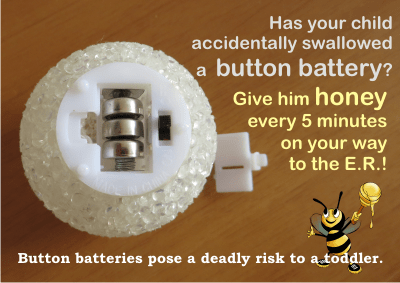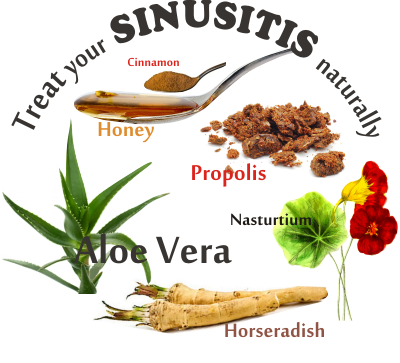Do you know what to do if your toddler or your baby has swallowed a battery? Do you know how toxic and dangerous these are? A button battery is pure poison, not a simple metal coin. And yes, they can lead to death.
It is said that more than 2,500 button batteries are ingested each year in the United States. They are small and shiny and perfectly fit into nose or ear and, of course, they could be easily swallowed.
What happens when a child swallows a button battery?
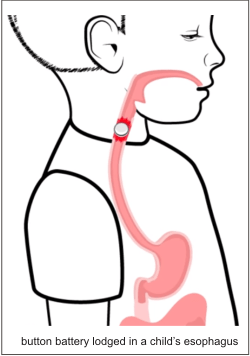 If you are lucky, the button battery may travel through the throat, stomach and intestines without issues, but it can also cause serious injury and can even be deadly.
If you are lucky, the button battery may travel through the throat, stomach and intestines without issues, but it can also cause serious injury and can even be deadly.
The battery can get stuck in the child’s throat and severely injure him, even put his life in danger. It can cause damage in 3 ways: create electrical current (which will rapidly increases the pH of the tissue adjacent to the battery), put pressure on sensitive tissues and leak chemicals that will burn the tissues.
The higher the voltage of the battery (3V vs. 1.5V), the faster the injury.
It will create caustic soda, that chemical that is used to unblock drains. It’s poison, that is why the child will be treated by the Poison Control Center.
It means a lot to know from the start what happen to your child. To know that he swallowed a button battery. This way the doctors won’t waste time with diagnosing. X-rays will tell them exactly where the battery is.
Another very important fact is to get to the hospital very quickly for endoscopic removal. The damage starts from the moment it is swallowed and gets worse with every second.
It will burn the esophagus and cause inflammation from the brain to the heart. Esophageal button battery injuries can include esophageal perforation, mediastinitis, vocal cord paralysis, tracheoesophageal fistula, esophageal stricture, or death caused by a significant hemorrhage of an aortoesophageal fistula.
Doctors need to remove the battery very quickly to minimize the damage.
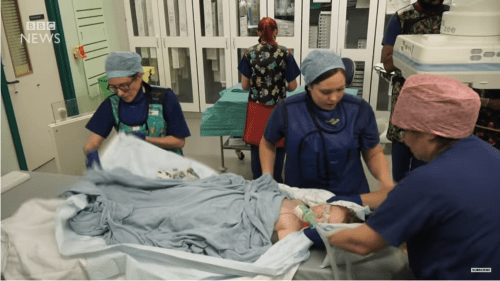
BBC news made the documentary “Button batteries pose ‘deadly’ risk to toddlers”, available on youtube, showing what happens inside the body when it comes into contact with lithium batteries.
They mimicked what happened using 2 pieces of ham, on which they placed 2 button batteries. The ham represents the delicate linen of the esophagus and water is used for saliva. The pictures speak for themselves:
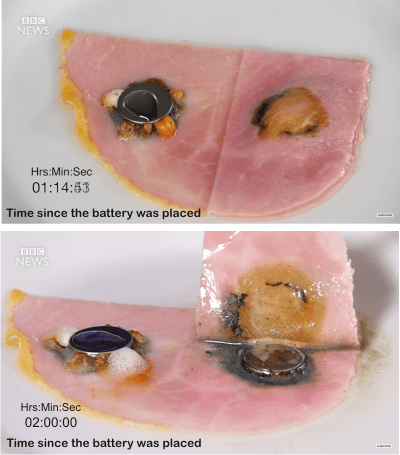
Symptoms after ingesting button batteries
You may have not seen your baby swallowing the battery, which is most unfortunate, but you should observe the following swallowed-battery symptoms:
Early symptoms:
sore throat
trouble swallowing
cough
Late symptoms:
difficult breathing
abdominal pain
chest pain
vomiting
shock
Toddlers can also stuck button batteries in their nose or ear. In the nasal cavity they can cause nasal mucosal injury, periorbital cellulitis, scar tissue formation and nasal septal perforation.
Injuries in the ear canal include hearing loss, tympanic membrane perforation, and facial nerve paralysis.
What to do if your child has swallowed a button battery
You need to immediately take him to the emergency room and tell them what happened. Or call 911 or directly the Poison Control Center. But is your first aid what really makes a lot of difference, that is why you must give your child to drink honey. Lots of it!
If your child swallowed a button battery give him to drink honey every 5-10 min on your way to the ER!
A recent study showed that giving honey immediately after swallowing a battery will minimize the damage. Either honey or Carafate®, a medication used to treat and prevent ulcers in the intestines, but which we don’t normally have in our houses. Yet, if you don’t have honey and a pharmacy is really close to your home, then go and buy Carafate. Then go to the ER.
The study “pH-neutralizing esophageal irrigations as a novel mitigation strategy for button battery injury” was published in June 2018 and was conducted by Anfang RR and his team from the Children’s Hospital of Philadelphia. It proved that in the crucial period between BB ingestion and endoscopic removal, early and frequent ingestion of honey in the household setting and Carafate® in the clinical setting has the potential to reduce injury severity and improve patient outcomes.
The researchers tested 7 common products, some weakly acidic household beverages, viscous liquids and a synthetic drug, for their ability to act as protective esophageal irrigations until endoscopic removal of the battery. For this they used cadaveric and live animal model (American Yorkshire piglets).
The tests were done using: apple juice, orange juice, Gatorade®, POWERADE® (a sports drink), pure honey, pure maple syrup, and Carafate®. And a 3 V lithium (3 V-CR2032)battery lodged on cadaveric porcine esophagus.
The irrigations occurred every 10 minutes from t = 5 min. After the experiment the pigs were euthanized.
The results showed that honey and Carafate® demonstrated to a significant degree the most protective effects in vitro and in vivo. Both neutralized the tissue pH increase and created more localized and superficial injuries. There were observed shallower depths of necrotic and granulation tissue and a decrease in the outward extension of injury in the deep muscle beyond surface ulcer margins (P < .05).
Always keep a jar of raw honey in your house. You never know when you need it! For example, did you know that you can put it on a burn? Here is a good raw honey you can find on Amazon.
Where can we find button batteries?
So many of our usual devices, small electronics and toys work with these kind of batteries. We never think of them. Thermometers, watches, games and toys, remote controls, hearing aids, calculators, bathroom scales, key fobs, electronic jewelry, cameras, holiday ornaments and others.
All small toys that do something, move some of their parts or make different noises, work with lithium button batteries. That’s because the others (AA or AAA) are too long and don’t fit.
Every toy that our children get in a Happy Meal at McDonald’s has at least one.
FFA even issued a lithium fire-safety alert. These toys can burn so easily, in a matter of seconds. Do not let your children play with them near fire or cooking devices.
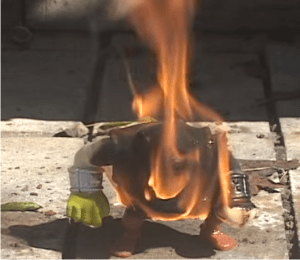
The warning “keep these items out of children’s reach” is really not there to cover the producer in case something bad happens. It is written with good intention, so the adult can understand the danger of all small items when it comes to small children.
Beware of life-threatening lithium batteries in toys!
The battery from these toys may be easily accessible or can fall out when the product is dropped. Make sure that the battery compartments of all electronic items are taped shut and loose batteries are always stored out of children’s reach.
==========
References:
https://www.ncbi.nlm.nih.gov/pubmed/?term=button+batteries+honey

